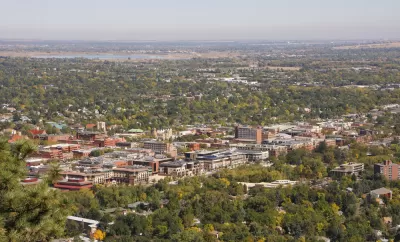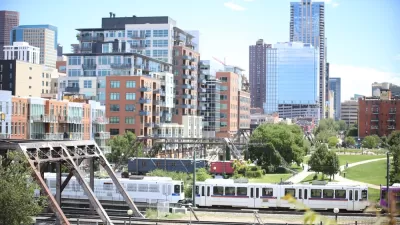The New York Times devotes significant ink to an argument against the use of zoning laws as tools of anti-growth politics.

[Updated 7/6/2017] The headline of a recent article by Conor Daugherty argues a strong claim about planning politics: "Anti-Growth Sentiment, Reflected in Zoning Laws, Thwarts Equality."
The article begins in Boulder, using Steve Pomerance, a former city councilmember that moved to Boulder in the 1960s, as an example of anti-growth advocate. Pomerance, according to Dougherty's description, believes that all of Boulder's charms are under threat: "Rush-hour traffic has become horrendous. Quaint, two-story storefronts are being dwarfed by glass and steel. Cars park along the road to the meadow."
Daugherty offers a counterpoint to those traditional anti-growth political stances: "a growing body of economic literature suggests that anti-growth sentiment, when multiplied across countless unheralded local development battles, is a major factor in creating a stagnant and less equal American economy."
That growing body of research includes a study by Peter Ganong and Daniel Shoag from January 2015, titled "Why Has Regional Income Convergence in the U.S. Declined?" [pdf]. Their work was also picked up by the White House Council of Economic Advisers last year, as the Obama Administration made its first attempt to debunk land use regulations as a tool of social and economic injustice. Daugherty also includes work by Chang-Tai Hsieh and Enrico Moretti [pdf] in the survey of research detailing the consequences of the zoning status quo.
[The photo caption was corrected above.]
FULL STORY: How Anti-Growth Sentiment, Reflected in Zoning Laws, Thwarts Equality

Planetizen Federal Action Tracker
A weekly monitor of how Trump’s orders and actions are impacting planners and planning in America.

Map: Where Senate Republicans Want to Sell Your Public Lands
For public land advocates, the Senate Republicans’ proposal to sell millions of acres of public land in the West is “the biggest fight of their careers.”

Restaurant Patios Were a Pandemic Win — Why Were They so Hard to Keep?
Social distancing requirements and changes in travel patterns prompted cities to pilot new uses for street and sidewalk space. Then it got complicated.

California Homeless Arrests, Citations Spike After Ruling
An investigation reveals that anti-homeless actions increased up to 500% after Grants Pass v. Johnson — even in cities claiming no policy change.

Albuquerque Route 66 Motels Become Affordable Housing
A $4 million city fund is incentivizing developers to breathe new life into derelict midcentury motels.

DC Area County Eliminates Bus Fares
Montgomery County joins a growing trend of making transit free.
Urban Design for Planners 1: Software Tools
This six-course series explores essential urban design concepts using open source software and equips planners with the tools they need to participate fully in the urban design process.
Planning for Universal Design
Learn the tools for implementing Universal Design in planning regulations.
Heyer Gruel & Associates PA
JM Goldson LLC
Custer County Colorado
City of Camden Redevelopment Agency
City of Astoria
Transportation Research & Education Center (TREC) at Portland State University
Camden Redevelopment Agency
City of Claremont
Municipality of Princeton (NJ)





























